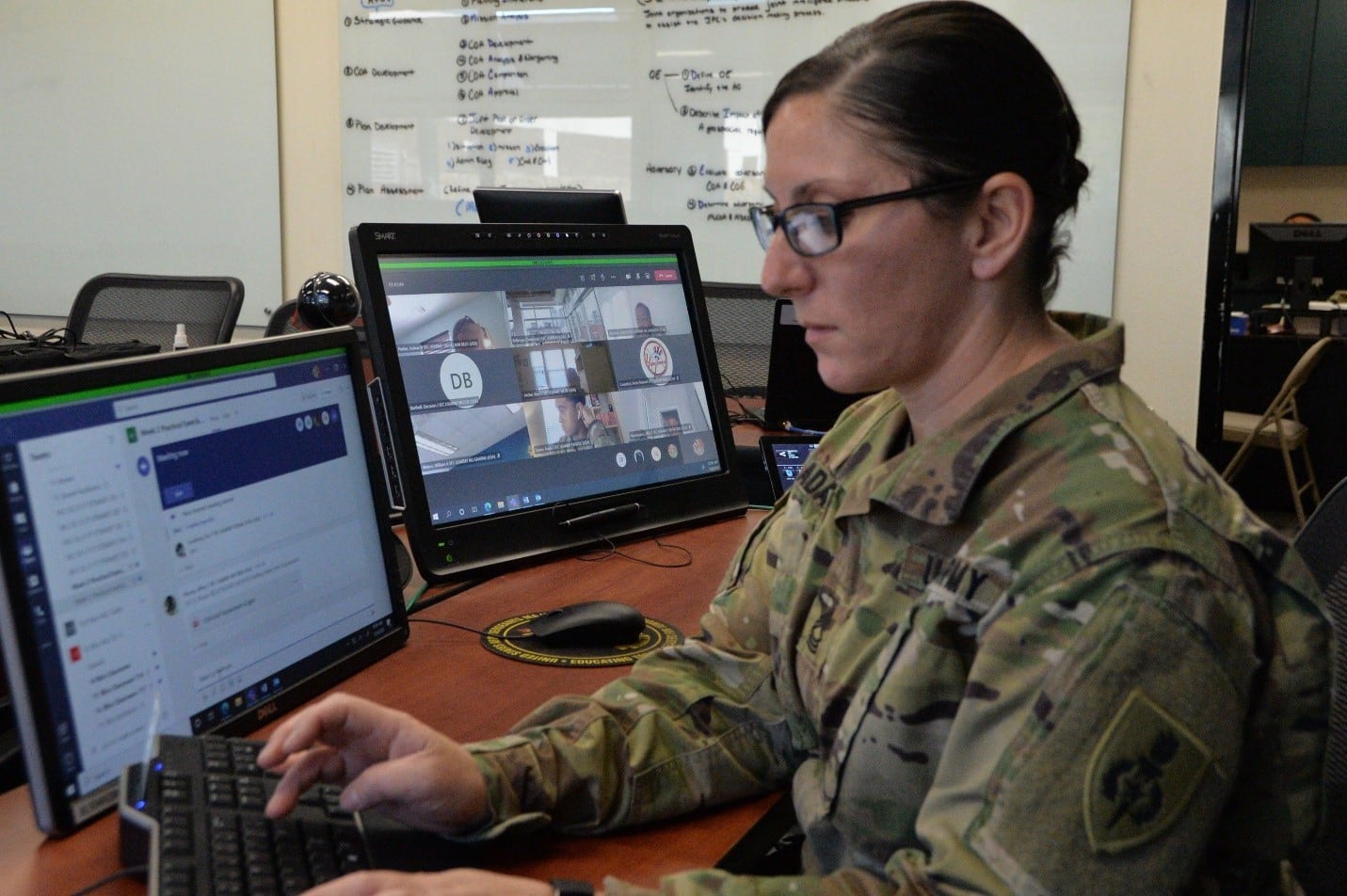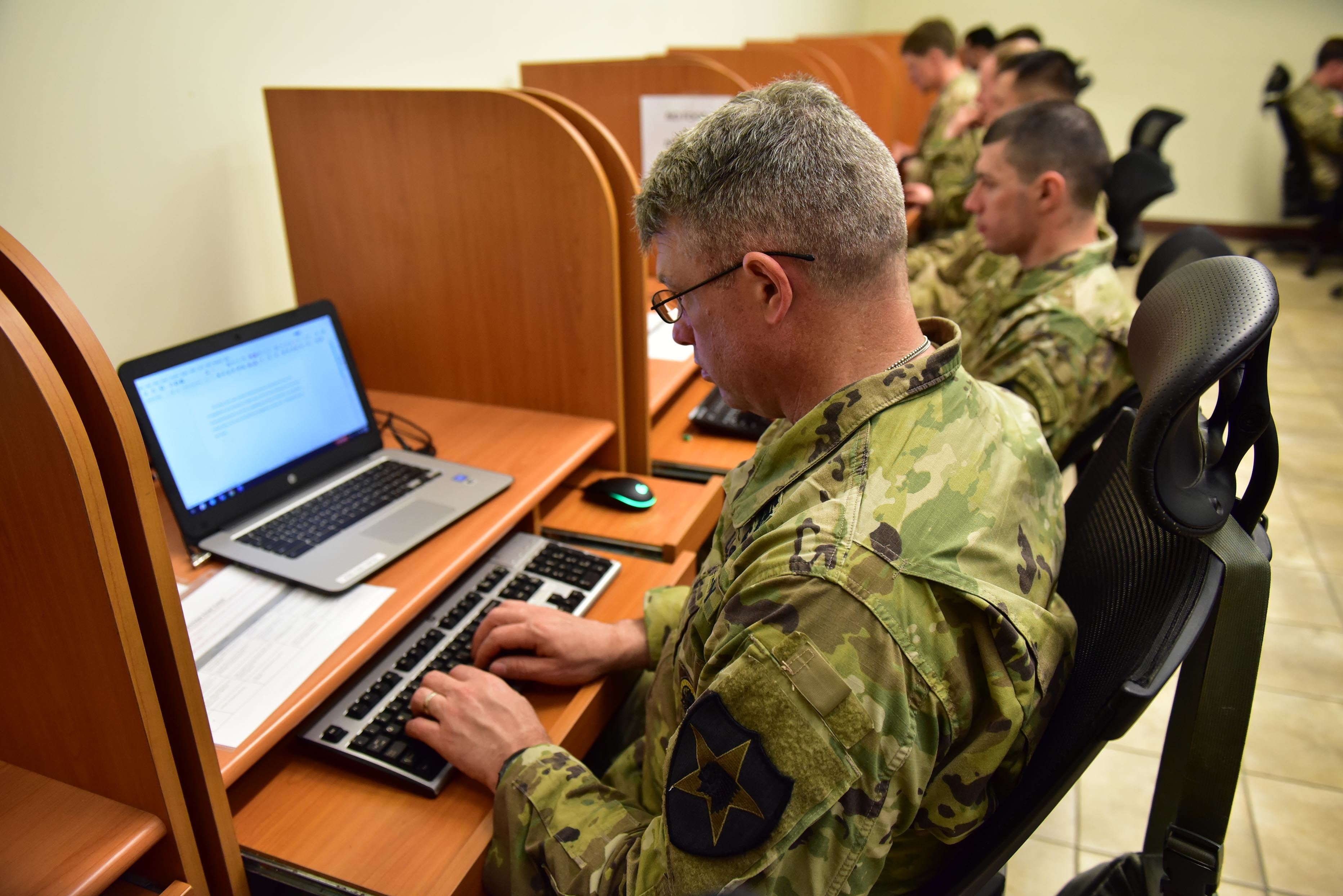This story was updated Dec. 6, 2021 at 2:45 p.m. EST with additional information provided by the Army after the story’s initial publication.
The Army said it is “committed” to providing official email access to all soldiers and Army civilians in response to concerns that the service’s decision to purchase hundreds of thousands fewer Microsoft email licenses than personnel will leave junior enlisted troops without official emails.
How will they do it? Well, they still haven’t decided — and the clock is ticking.
The issue publicly came to light in November, when Army information technology officials told commands that the service’s transition to the Army 365 collaboration platform — to include new army.mil email access — would not include all Army personnel.
Army G-6 officials currently estimate that 250,000 junior enlisted troops, civilians and contractors will not receive a license for Army 365 services, they said in a Wednesday briefing to update commands on their progress. Army Times reviewed audio from the meeting.
According to a source with knowledge of the transition, the Army initially considered eliminating official email access for many junior soldiers altogether.
RELATED

In recent months, though, the service has decided to provide basic email service for the soldiers and civilians who officials think do not need Army 365 access.
“The Army remains committed to ensuring all Soldiers, Civilians, and required contractors continue to have Army-provided email access,” confirmed Army spokesperson Bruce Anderson in an emailed statement.
In a follow-up statement, Anderson confirmed that the service decided in April “to provide an alternative Army-procured email solution” to troops who won’t get new Army 365 army.mil emails.
According to the G-6 briefers, the Army still has not decided how it will provide those extra email accounts, and the existing Defense Enterprise Email service and all mail.mil emails will go dark on March 31.
It’s not clear why the Army has waited so long to establish an alternative email solution, given that the service decided in April that it would provide those additional email accounts.
Anderson confirmed that DEE’s old mail.mil emails will be entirely decommissioned on March 31, but said the service is “confident [that] long-term access to official email will be in place prior” to the deadline.
And as the deadline nears, the Defense Infrastructure Security Agency has already started to delete “tens of thousands” of DEE email accounts regardless of whether their owners have new Army 365 email addresses, the G-6 officials said in Wednesday’s briefing.
The deleted accounts are “based on DISA account usage and storage analysis,” said Anderson in his follow-up statement, and “if a Soldier’s email address is inadvertently turned off, they should report that fact to their chain of command immediately.”
Fewer Microsoft licenses than personnel
The licensing shortfall — and potential email access cliff — stems from the service’s decision to save on costs by buying individual licenses for its “Army 365″ Microsoft-based collaboration platform for a limited portion of the force rather than for everyone, explained a source familiar with the transition.
The service only plans to issue Army 365 licenses and new army.mil email access to NCOs and officers, according to an interim licensing guidance memo issued by Lt. Gen. John Morrison Jr., the service’s top uniformed IT official.
Junior enlisted troops requiring Army 365 email or Microsoft collaborative platform access will have to obtain an exception to policy from the first colonel in their chain of command.
Army Times previously wrote about the memo, and readers pointed out that junior soldiers need official email in order to receive sensitive personal documents, access key benefits, receive orders and more.
Currently the Army has only purchased 950,000 licenses, the memo stated.
That’s not enough to cover the more than one million soldiers across the force, much less its hundreds of thousands of civilians and contractors. The Air Force, by comparison, bought enough licenses for all of its personnel when it transitioned to Microsoft 365 services.
“They could just pay for more Army 365 licenses and be done,” said the source in exasperation. “The Air Force literally bought licenses for everyone. It’s why they didn’t have this issue.”
But Army G-6 officials are hesitant to buy more licenses because the Army 365 license agreement is funded from a preexisting program rather than its own dedicated contract, leaving leaders concerned about cost overruns, said a second source with knowledge of the transition.
“The decision whether to provide the Army 365 suite of capabilities is based entirely on whether that Soldier, Army civilian employee, or contract employee requires those capabilities to accomplish their mission,” said Dr. Raj Iyer, the Army’s top IT official, in a statement provided after this article’s publication.
That means the Army will be looking to secure an “alternate email solution” to provide basic email capabilities, as one G-6 official described it in the briefing, to address the 250,000 person shortfall.
Anderson, the Army spokesperson, argued in his follow-up statement that the decision is meant to help the service “be good stewards of taxpayer funds rather than [influenced] by any limitations caused by any contract vehicle.”
According to publicly-available licensing tier costs available from Microsoft, though, providing limited email licenses through Army 365 for 250,000 troops would cost only $24 million per year, at a monthly rate of $8 for each license. If the goal of the “alternate email solution” is to save the Army money, that may leave little room for cost overruns on a project that will require extremely fast delivery and implementation.
Is time running out?
G-6 officials said in Wednesday’s briefing that the service will decide before Christmas how it will solve the looming email shortage. Yet the Army has not yet issued a request for proposals that will allow contractors to formally submit plans for providing email.
Two potential suitors, according to a source familiar with the process, are CACI and Google, which has been providing prototype Gmail-based official email services to select Army organizations.
Anderson, the Army spokesperson, declined to provide information on the possible solutions because they are “nearing contract negotiations.”
But March 31 looms large, and IT sources who spoke with Army Times said they’re skeptical the Army is capable of meeting the deadline at this point.
“Any option at this late stage besides buying licenses will see [the Army] exceed [the] deadline,” argued one source.
A second source suggested the Army may “play chicken” with the Defense Infrastructure Security Agency in an effort to buy more time with mail.mil email and extend the deadline to field an alternate email solution.
Iyer is undaunted by the challenge, though, telling Army Times that “every Soldier, Army civilian employee, or contract employee will have an Army-provided email account even after DEE is decommissioned.”
Davis Winkie covers the Army for Military Times. He studied history at Vanderbilt and UNC-Chapel Hill, and served five years in the Army Guard. His investigations earned the Society of Professional Journalists' 2023 Sunshine Award and consecutive Military Reporters and Editors honors, among others. Davis was also a 2022 Livingston Awards finalist.





